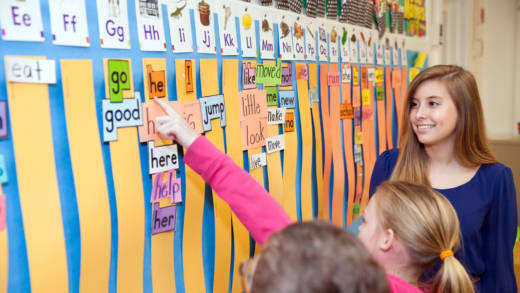“When they go to college they are so far ahead of the game that they are able to excel and dig deeper,” Shaner said. Perhaps more importantly, participating high school students are getting a pretty good idea of what teaching is really like. At the end of the Teacher Academy some students decide it’s not for them, but others have found a lifelong passion.
Shaner doesn’t shy away from talking about the hard parts of education with his students. He leads discussions on funding inequalities and segregation, different forms of teacher evaluation, and the work load. During the first marking period of senior year, when students are observing in real classrooms, Shaner makes sure they have to do a lot of the “grunt work” inherent to the job, like photocopying and making bulletin boards. He wants them to understand that while working with kids may be what excites them, paperwork is part of teaching too.
Tyler Jones was part of a teaching program at his high school in Virginia Beach. He interned in a music class and worked with a student who often acted out. Jones was able to form a connection with the boy and the gratification he felt when his student made progress hooked him on teaching.
“I want to be that for my own students one day,” Jones said. He’s currently attending Tidewater Community College and speaks about his experiences with Educators Rising regularly. He’s grateful he had the opportunity to explore a career while still in high school, instead of potentially committing four years of college to something he didn’t know much about.
Educators Rising announced it will now offer free micro-credentials that high school and college students can earn to demonstrate competency in specific skills. The courses take between five and 15 hours to complete and include anti-bias instruction, classroom culture, collaboration, formative assessment and learner engagement. The micro-credential represent topics that may not be covered in high school teaching courses, but are ones that Educator Rising believes will be crucial for future teachers to be successful.
“They are designed to articulate clearly to young people who are interested in teaching, here is the bar for taking those first steps,” said Educators Rising Co-Director Dan Brown. A micro-credential is an asynchronous course offered through an online platform that requires participants to learn about and then try research-based practices in their own interactions with students. They then submit evidence of their work, get feedback from reviewers, reflect on what they’ve learned and ultimately must demonstrate competency in the set of skills to earn the credential.
“These skills are designed to coherently connect with the skills teachers need in the classroom,” Brown said. The five micro-credentials Educators Rising currently offers are rooted in the standards the organization developed with the National Board for Professional Teaching Standards. High schools around the country can use Educators Rising curriculum in their classes to essentially map out the first phase of a teacher’s career. Now, they can also augment those courses with the new micro-credentials.
Brown said the micro-credentials are intended to clarify and build foundational mindsets for teachers of the future. “It can be hard to know where you stand as a teacher,” he said. “I fear that a lot of folks in classrooms are sort of winging it and determining their success based on how they feel about the experience that may be untethered from professional standards of practice.” Brown says the micro-credentials his organization has developed are not a substitution for a teacher credential, but rather a way for high school students interested in teaching to deepen their skills and demonstrate their commitment to colleges and future employers.
Shaner helped pilot the micro-credentials with his students at Smyrna High School and has mapped them onto his curriculum so that feedback students get on their micro-credential work is now part of their final grade in his class. He says his students were already building a robust portfolio during their time in his program, but it’s only certified by Smyrna School District.
Shaner appreciates that the feedback and practice loop inherent in the micro-credential builds students’ sense that teaching must always be a reflective practice, and that once they have classrooms of their own they will always be learning and adapting to the students in front of them.
“This will look really good to colleges and future employers in the education system because it will show we take this seriously,” Tyler Jones said about earning micro-credentials. He plans to take them on top of his other coursework.
“They’re fired up about making a difference,” Brown said of young people like Jones. Even better, Brown cited a report that found 60 percent of teachers end up working within 15 miles of where they went to high school. Getting current high school students interested in teaching could be one of the best ways to build a teacher pipeline back to the building. And, he hopes that the micro-credentials could help guide those young teachers with skills that will particularly useful in today's classrooms.


